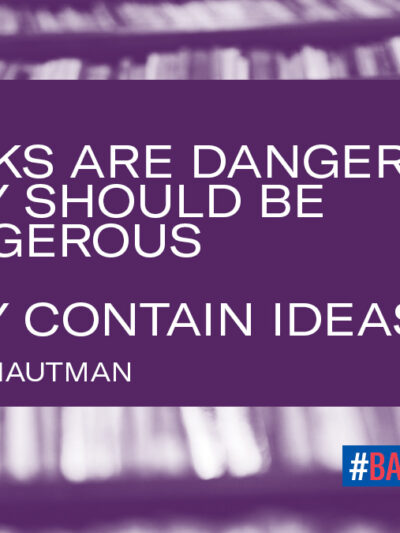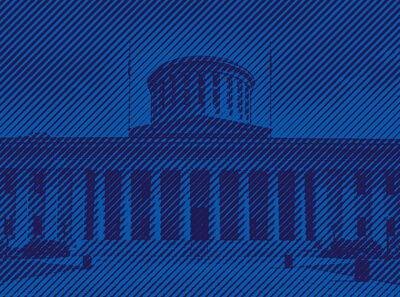News & Commentary
Banned Books Week… More Relevant than Ever?
Do you think the practice of banning books is a thing of the past? Something that books such as Animal Farm, The Catcher in the Rye, and To Kill a Mockingbird have been subject to??Think again.Just earlier this month, the internationally beloved Harry Potter series was banned yet again by a Catholic school in Nashville, Tennessee for supposedly depicting “actual curses and spells.” Similarly, in April of this year, a Georgia sheriff was illegally denying books to prisoners by implementing a policy that not only restricted “incoming books from family, publishers and organizations, but also remove[d] existing books from inmates” – thus limiting reading options to a “jail book cart.”Do you think these are two instances few and far in between? Nope! According to the American Library Association, there was a staggering total of 347 book challenges in 2018 alone. That's almost a book challenge a day!Who were the challengers?Patrons (33%)Parents (32%)Board/administrations (13%)Librarians/teachers (10%)Political/religious groups (6%)Elected officials (3%)Students (3%)To further add, these challenges took place in public libraries (59%), school libraries (23%), school (14%), academic institutions (3%), and special/prison libraries (1%).So why are we telling you this? Because it’s Banned Books Week! This week is all about having the freedom to read whatever and whenever we want to. It brings together individuals from all walks of life, from librarians to students to activists to band together in shared support to seek and to express ideas, even those some may consider unorthodox or unpopular. Most importantly, it’s about educating those who may not exactly know why banning books is such a problem.Simply put, banning books is a type of censorship, and since its inception, the ACLU has actively opposed government censorship in all forms – whether it be books, radio, television, movies, or the internet. Freedom of expression is a civil liberty found in the First Amendment of the Constitution, and when government institutions engage in book banning, it’s not only the denial of being able to read, think, say, and write whatever we’d like, but it is fundamentally unconstitutional and encroaches on our rights as people living in America.Book burning is the quintessential image of what individual rights and freedoms being crushed by a government body looks like – this is exactly why photos depicting this practice are so chilling – because we can physically see our rights being burned at the stake.However, it’s not only the sight of it that should scare us. Burning books is also a dangerous slippery slope which can – and oftentimes does – lead to more rights being taken away. When governments burn, ban, and censor books, the desire of total control over citizens burns even brighter and deeper. Although government censorship of books is the most alarming, it should also be concerning when a church, private school, or non-governmental authority decides that it wants to challenge or ban a book for various reasons. The ACLU’s biggest concern, after all, is when the government bans books, because it is unconstitutional; but shouldn’t private institutions, organizations, companies, and other authorities also uphold the fundamental principles of the First Amendment?Of course they should.This leads us to a very important question: why would a government entity or other authority want to ban or challenge books? There are many reasons ranging from social, political, sexual, and religious reasons. For instance, Maya Angelou’s I Know Why the Caged Bird Sings (1969) has been one of the most frequently challenged books in American history for various reasons including anti-whiteness, sexually explicit depictions, and use of offensive language. Jill Twiss’ A Day in the Life of Marlon Bundo, a heartwarming story about a boy bunny who falls in love with another boy bunny, has frequently been banned and challenged due to – you guessed it – it’s LGBTQ theme. Khaled Hosseini’s The Kite Runner also makes this list, because it apparently promotes Islam and could “potentially lead readers to resort to terrorism.”It truly should come as no surprise that many challenged and banned books are written by minority writers or are about topics that ultimately speak about or to minorities and their experiences. Thus, banning books goes beyond just censorship, it perpetuates the marginalization of those who already have a hard time legitimizing their voices and representation in the mainstream, because they do not fit the status quo.So this Banned Books Week, we here at the ACLU of Ohio challenge you to educate those who may not know that banning and challenging books still occurs in America and tell them why it’s such a big deal; read a banned book or two; celebrate the fact that it is our First Amendment right to read any and every type of book that we please; and/or get on social media and participate in all things Banned Books Week!We challenge you, because as banned author Stephen Chbosky has aptly put: “Banning books gives us silence when we need speech. It closes our ears when we need to listen. It makes us blind when we need sight”.And that silencing of speech is something that we should never allow – by anyone.
By Sarah Khan-Williamson

Hard Time Admitting The Constitution Is Flawed? We’ll Do It For You.
It’s Constitution Day! Okay – so we don’t get out of work or school today, nor do we get to barbeque our favorite foods or watch giant things go boom in the night sky, but is today any less important than Independence Day? Memorial Day? Veterans Day? To put it quite simply, the answer is no. Constitution Day is just as important as any other holiday, and we at the ACLU of Ohio are here to tell you why.Constitution Day celebrates what is one of the most important documents in our nation’s history. 232 years ago, 39 revolutionists finally decided to come together and sign the Constitution (which had been drafted earlier that year in May), and it started like this:"We the people of the United States, in order to form a more perfect union, establish justice, insure domestic tranquility, provide for the common defense, promote the general welfare, and secure the blessings of liberty to ourselves and our posterity, do ordain and establish this Constitution for the United States of America."This seems pretty simple, right? According to this introduction, this document should bring peace and tranquility all across the nation while guaranteeing rights for every single citizen, right? …Right?Again, the answer is no.It is no secret that the Constitution signed on that fateful day of September 17, 1787 was highly flawed. It denied women and minorities, especially black individuals, their basic human rights for decades to come. It protected slavery. It denied civil liberties that should have been guaranteed to all. To be 100% honest, when it all boiled down, the only people who were guaranteed their civil liberties were white men who were all extremely similar to the white men who blotted the Constitution with their very important signatures.In fact, those in politics and government – and quite honestly, even everyday people – knew just how flawed the Constitution was. Individual rights were not specified for anyone past propertied white men, and even Thomas Jefferson argued that “a bill of rights is what the people are entitled to against every government on earth, general, or particular, and what no just government should refuse, or rest on inference”. That’s why just two years and 81 days after it was signed, ten amendments were added. Within these ten amendments, civil rights and liberties such as freedom of speech, religion, protest, and press were guaranteed, and protections of privacy, due process of law, and power were also outlined. These amendments are what we so lovingly call the Bill of Rights today.BUT – and this is a huge but – did that mean the inherent flaws were fixed? Were women and minorities finally granted their rights and brought under the umbrella of the Constitution?Sadly, once again, the answer is… no.So… the question you may be asking is why? Why are we celebrating a document that was so flawed? Why are we, especially an organization such as the ACLU of Ohio, celebrating something that initially denied civil liberties to all women and minorities?It is because since that day in 1787, men have gone to war against their own brethren in a bloody civil war which resulted in the Thirteenth Amendment. This Amendment ultimately abolished slavery and involuntary servitude. Women valiantly fought and gained their right to vote with the Nineteenth Amendment– guaranteeing voter rights for sisters, daughters, and fellow female compatriots indefinitely (though important and unfortunate to note that Asian women weren’t granted their right to vote until 1952, Native American women until 1957, and black women until 1965) Civil rights leaders and supporters put their lives on the line to fight – and ultimately win – against exclusionary voting practices that intended to prevent black individuals from participating in politics. Due to these heroes, we now have the Fifteenth Amendment which prohibits poll tax and other types of taxes that condition the right to vote.Furthermore, though it was flawed, the Constitution has served as a foundation in support of civil liberties for all throughout our nation’s history – especially in the courts. In 1967, Loving v. Virginia resulted in a nation-altering victory in which the Supreme Court ruled that laws prohibiting interracial marriages were unconstitutional. Just four years prior, the Supreme Court ruled, on the basis of the Fifth and Sixth Amendments, that states are required to provide an attorney to defendants who can’t afford one in criminal cases. In 1973, the Supreme Court turned to the Fourteenth Amendment in Roe v. Wade to support the right to privacy in a woman’s personal decision to have an abortion. This same Amendment came to the forefront over four decades later when the Supreme Court decided that due to the Equal Protection and Due Process Clauses, same-sex couples were to be guaranteed the fundamental right to marry. It is no surprise that this same Amendment also played a huge part in the outcome of Brown V. Board of Education of Topeka in 1954, again supporting equal protection that is to be guaranteed by the Fourteenth Amendment.And this is exactly why we celebrate Constitution Day – it is exactly why everybody in this nation should celebrate Constitution Day.Because people bravely fought and have either lost or endangered their lives to make sure everybody can access the freedoms guaranteed in the Constitution.Because people have spent their entire lives to further diminish the flaws the Constitution carries.Because time and time again, the Constitution has been called to the stand, and it has further guaranteed, the rights of those that it did not initially guarantee.So though it may be flawed, we the people, have recognized the intentions behind it to find the foundational support to guarantee that everybody be protected and given the same rights equally.And as we celebrate this day, let’s hope – no, let’s ENSURE, that our current Supreme Court Judges, state and federal legislators, and other government leaders and officials only further our progress towards a flawless Constitution and the perfect union that we dream of – one that, for one hundred years, the ACLU has fought for by protecting and expanding individual rights and liberties guaranteed in the Constitution. In the end, the future we dare to create, depends on the commitment of all of us, we the people.Won't you join us?
By Sarah Khan-Williamson
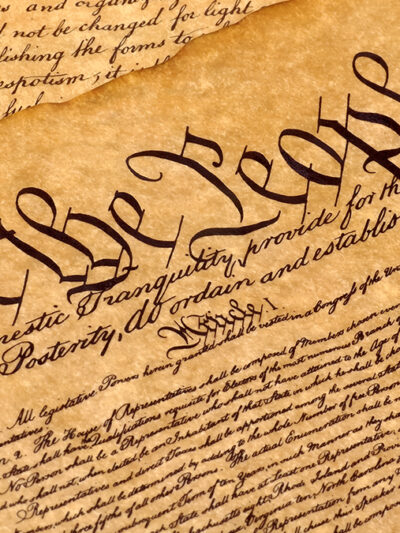
A Brief History of Our Recently Settled Voter Purge Case
Our long-fought voter purge case – APRI v Husted - finally came to a favorable conclusion on August 29, 2019. Since it was long, here’s a brief history:
We filed suit in early 2016 challenging Ohio’s practice of purging voters for failure to vote. Our complaint had two counts: (1) that the purge process itself was unlawful because the National Voter Registration Act (“NVRA”) forbids purging for failure to vote, and (2) that, even if Ohio’s purging were lawful, the hundreds of thousands -- to millions -- of Ohioans who had been purged over the years had not been purged properly because the notice card that they had been mailed did not comply with the requirements of the NVRA.
We lost in the trial court, but the 6th Circuit Court of Appeals ruled in our favor. At that time, the 2016 presidential election was about to occur, so the district court provided a remedy - which was supposed to be temporary while the rest of the case played out. The remedy was a process whereby voters who had been purged, even though they were no longer registered, could vote provisionally and, if they still lived at the address where they had registered, their provisional ballot would count. This remedy was referred to by the Secretary of State (and then everyone else) as the “APRI Exception.” About 7,000 purged Ohioans were able to have their votes counted in the 2016 Presidential election, thanks to the APRI Exception.
The Supreme Court ruled 5-4 on our Count I in 2018 that Ohio’s Purge was not a violation of the NVRA because, the way the majority rationalized it, it purges people for failing to respond to a notice, rather than for failing to vote. (Even though the notice is triggered by a failure to vote.)
That left Count II to be litigated. We lost on Count II in the trial court just before the 2018 election, but we quickly filed an emergency appeal to the 6th Circuit, and obtained an extension of the APRI Exception so that Ohio voters who had been purged could vote in the upcoming election.
The Secretary of State voluntarily continued the “APRI Exception” while the 6th Circuit appeal continued to be litigated. Similarly he voluntarily implemented several reforms – such as mailing out “last chance” notices to voters who were on the brink of being purged. Ultimately, after many, many months, finally over the last few days, we were able to reach and execute an agreement, settling the case on terms that are very favorable to Ohio voters.
The main provisions of the settlement can be summarized as follows:
The “APRI Exception” will now continue through the end of 2022. It will also be expanded to include more voters, including those who had last voted in 2007 (who had received their notices as far back as 2011). And it will be further expanded to include not only purged voters who still live at the same precise address, but also voters who still live in the same county.
Some of the reforms that the Secretary had voluntarily directed are embedded in the settlement agreement, so that they cannot be retracted.
The Secretary will publish data so that usage of the “APRI Exception” can be monitored.
As a point of clarification, the list that the Secretary recently published of voters who were purged on September 6, was not a subject of this lawsuit. However, the "APRI Exception" could benefit those on it because they will be permitted to vote provisionally and have their votes counted if they are eligible.
By Freda J. Levenson
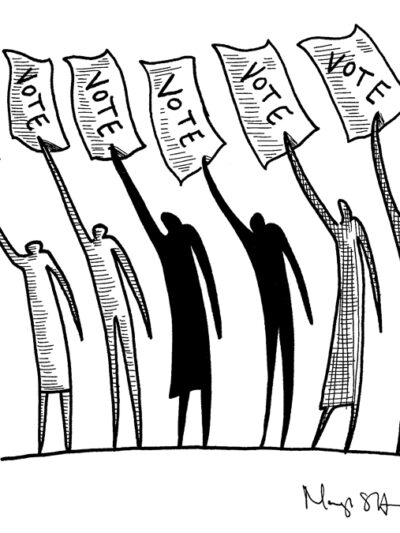
Campus Activism: Young Activists Cultivating Long-Lasting Skills
College students in the United States have a rich history of participating in activism work to make their voices heard. In the campus setting, students have a favorable atmosphere to gather with peers based on a common interest relating to various social, political, or environmental issues, and these issues often intersect. Campus activism can be used to prompt political change, increase awareness of specific issues, or to create social change. Student activists can use their organizing efforts to impact policy or program change within their own university or they can work to influence change at the local, state, or even federal level.
By Ella Lewie
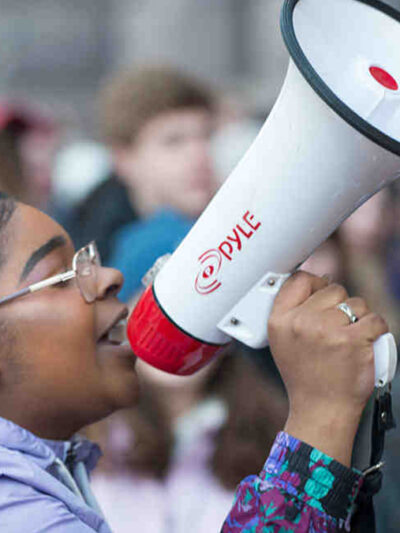
An Update on our Transgender Birth Certificate Lawsuit
To receive updates on this case straight to your inbox, join our GoogleGroups email list. You can access this group even if you don't have a Gmail account. Read more here.
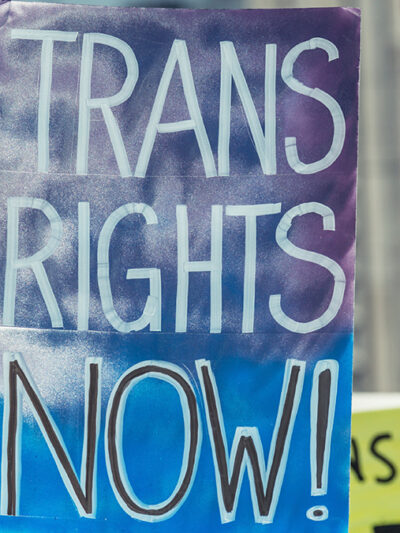
Cleveland Police Need a Strong Policy to Protect Transgender and Gender Non-Conforming Residents

Anti-Discrimination Ordinances
We have come a long way in the fight for equal rights for LGBTQ people in this country. Ohio law protects state employees from discrimination based on sexual orientation and gender identity. But private citizens lack many basic protections in housing, public accommodations, and employment. It’s time for Ohio’s legislators to update our laws. No one should be fired, evicted, or denied service because of who they are or who they love.

Stay Informed
Sign up to be the first to hear about how to take action.
By completing this form, I agree to receive occasional emails per the terms of the ACLU’s privacy statement.
By completing this form, I agree to receive occasional emails per the terms of the ACLU’s privacy statement.

